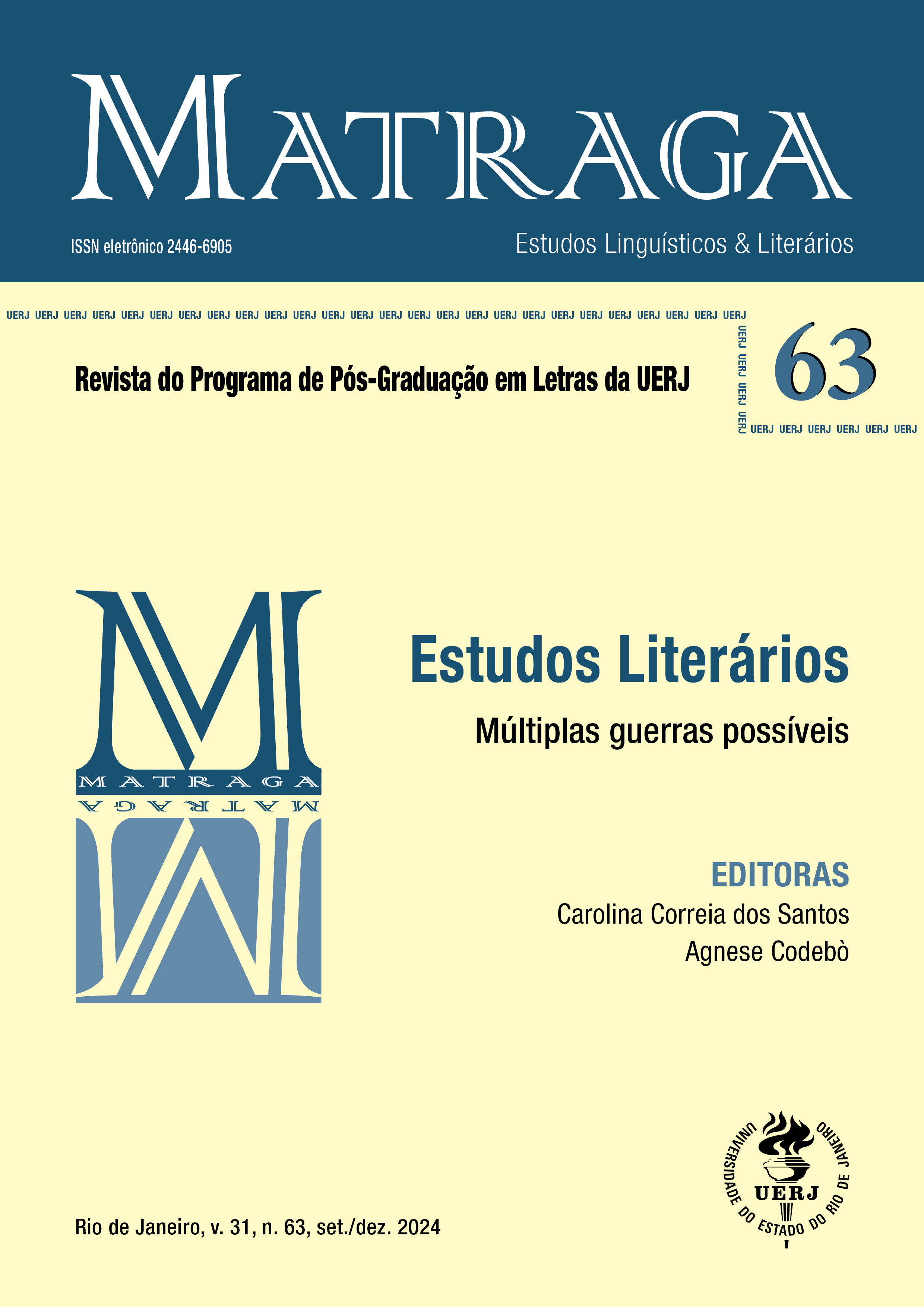“The craze for the horrible”: the grotesque and the First World War in Brazilian Literature
DOI:
https://doi.org/10.12957/matraga.2024.84035Keywords:
Brazilian literature, 20th century, World War I, GrotesqueAbstract
Through the perspective of the poetics of evil — a theoretical and historiographical investigation of the artistic modes of literary representation and expression of the darkest and most disturbing aspects of human experience —, the article describes the impact that the great 20th century war conflicts, especially World War I, had on Brazilian literary narratives of the century’s first decades. The main objective is to demonstrate how changes in the perception of scientific and technological advances — from praised engines of progress to feared tools of extermination — impacted literary creation. Our hypothesis is that the poetics of the grotesque were the main artistic strategy to encompass a perception of irrationality and absurdity that permeated the period. To illustrate our argument, we present excerpts from works by Coelho Neto, João do Rio, Alfredo Taunay, Júlia Lopes de Almeida, Gustavo Barroso, Mário Sette, and Afonso Schmidt.
Downloads
References
ALMEIDA, Júlia Lopes de. Pela pátria. In: ALMEIDA, Júlia Lopes de. Ânsia eterna. Rio de Janeiro: H. Garnier, 1903. p. 208-215.
ARENDT, Hannah. Sobre a violência. Tradução: André Duarte. 16. ed. Rio de Janeiro: Civilização Brasileira, 2023.
ASTRUC, Rémi. Le Renouveau du grotesque dans le roman du XXe siècle: essai d’anthropologie littéraire. Paris: Classiques Garnier, 2010.
BARROSO, Gustavo. A dança macabra. Fon-Fon, Rio de Janeiro, ano XIX, n. 22, p. 20-22, 30 maio 1925.
BARROSO, Gustavo. A mania do horrível. In: BARROSO, Gustavo. Ideias e palavras. Rio de Janeiro: Leite Ribeiro, 1917a. p. 17-20.
BARROSO, Gustavo. Velhas armas, novas armas. In: BARROSO, Gustavo. Ideias e palavras. Rio de Janeiro: Leite Ribeiro, 1917b. p. 229-236.
BENJAMIN, Walter. Magia e técnica, arte e política: ensaios sobre literatura e história da cultura. Tradução: Sergio Paulo Rouanet. 7. ed. São Paulo: Brasiliense, 1994.
COELHO NETO. Às quintas. Porto: Livraria Chardron, 1924.
COELHO NETO. Um aedo. In: MENEZES, Castro. Quadros da guerra. 2. ed. Rio de Janeiro: Jacintho Ribeiro dos Santos, 1917. p. i-vi.
DURÃO, Fabio A.; PERUCHI, Camila. Sobre o realismo socialista brasileiro de Jorge Amado. Literatura: teoria, história, crítica. Bogotá, v. 24, n. 1, p. 187-208, 2022.
FLEISCHER, Marion. O expressionismo e a dissolução de valores tradicionais. In: GUINSBURG, J. (Org.). O expressionismo. São Paulo: Perspectiva, 2002. p. 65-82.
FRANÇA, Júlio; SILVA, Daniel Augusto P. (Orgs.). Poéticas do Mal: a literatura de medo no Brasil (1830-1920). Rio de Janeiro: Acaso Cultural, 2022.
KAYSER, Wolfgang. O grotesco: configuração na pintura e na literatura. Tradução: J. Guinsburg. São Paulo: Editora Perspectiva, 1986.
LAGES, Susana. Poesia lírica expressionista. In: GUINSBURG, J. (Org.). O expressionismo. São Paulo: Perspec¬tiva, 2002. p. 157-188.
MATTOS, Cláudia. Histórico do expressionismo. In: GUINSBURG, J. (Org.). O expressionismo. São Paulo: Perspectiva, 2002. p. 13-39.
MONNET, Agnieszka; HANTKE, Steffen. Ghosts from the battlefield: a short historical introduction to the War Gothic. In: MONNET, Agnieszka; HANTKE, Steffen. War Gothic in Literature and Culture. New York: Routledge, 2016. p. xi-xxv.
NAZÁRIO, Luiz. Quadro histórico. In: GUINSBURG, J. (org.). O expressionismo. São Paulo: Perspectiva, 2002. p. 13-40.
PERRONE-MOISÉS, Leyla. Mutações da literatura no século XXI. São Paulo: Companhia das Letras, 2016.
PINKER, Steven. O novo iluminismo. Tradução: Laura Motta e Pedro Soares. São Paulo: Schwarcz, 2018.
POLIAKOV, Léon. A Europa suicida. Tradução: Hilde Teixeira. São Paulo: Perspectiva, 1985.
RIO, João do. Algumas figuras do momento: Na Conferência da Paz, III. Rio de Janeiro: Villas-Boas & C., 1920.
RIO, João do. Patriotismo. In: RIO, João do. Sésamo. Rio de Janeiro: Francisco Alves, 1917. p. 175-196.
SCHMIDT, Afonso. Carne para canhão: peça em três atos. São Paulo: Unitas, 1934.
SETTE, Mário. Ao clarão dos obuses. Recife: I. Nery da Fonseca, 1917.
SILVA, Daniel Augusto P. O grotesco e a ficção fin-de-siècle na França e no Brasil (1880-1920). 229 f. Tese (Doutorado em Letras) – Instituto de Letras, Universidade do Estado do Rio de Janeiro, Rio de Janeiro, 2023.
SILVA, Leonardo. As armas do Império: Guerra do Paraguai, literatura do Brasil. 2014. Dissertação (Mestrado em Literatura Brasileira) – Faculdade de Filosofia, Letras e Ciências Humanas, Universidade de São Paulo, São Paulo, 2009.
SOUZA, Ricardo Timm de. Filosofia e expressionismo. In: GUINSBURG, J. (org.). O expressionismo. São Paulo: Perspectiva, 2002. p. 83-102.
TAUNAY, Alfredo. A retirada da Laguna. Brasília: Senado Federal, 2011. [1871].
WOOLF, Virginia. As histórias de fantasmas de Henry James. In: FRANÇA, Júlio; NESTAREZ, Oscar; ZANINI, Claudio (org.). As artes do Mal: textos seminais. Tradução: Ana Resende. Rio de Janeiro: Acaso Cultural, 2024.
WRIGHT, Angela. Britain, France and the Gothic, 1764-1820. Cambridge: Cambridge University Press, 2013.
Downloads
Published
How to Cite
Issue
Section
License

This work is licensed under a Creative Commons Attribution-NonCommercial 4.0 International License.
Authorization
Matraga – Scientific Journal of the Post-graduate Program in Arts and Humanities of UERJ is authorized to publish the article submitted here, if it is accepted for online publication. It is attested that the contribution is original, that it is not being submitted to another publisher for publication, and that this statement is the expression of truth.
The works published in Matraga's virtual space – Scientific Journal of the Post-graduate Program in Arts and Humanities of UERJ will be automatically transferred, and your copyright is reserved to Matraga. Its reproduction, in whole or in part, is conditional on the citation of the authors and the data of the publication.

Matraga uses license Creative Commons - Attribution-Non-Commercial 4.0 International.





